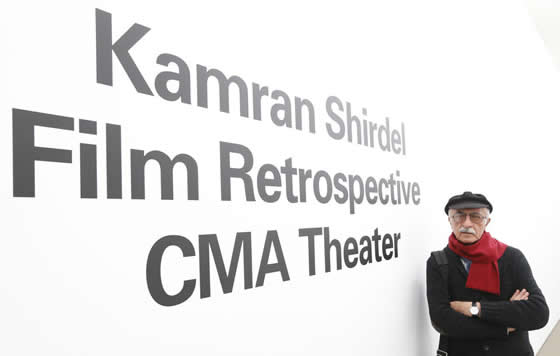 PITTSBURGH (AP) — Kamran Shirdel’s films have been censored, banned and celebrated for documenting hidden parts of Iranian society — the plight of Tehran’s prostitutes, the desperation of female prisoners, and the reality behind false heroes.
PITTSBURGH (AP) — Kamran Shirdel’s films have been censored, banned and celebrated for documenting hidden parts of Iranian society — the plight of Tehran’s prostitutes, the desperation of female prisoners, and the reality behind false heroes.
Now he’s visiting the U.S. for the first time, speaking about his art and what it took to make it as a socio-political documentary filmmaker, first under the Shah then under Islamic rule.
Shirdel, 75, began filming poor and working-class Iranians in the 1960s. Early documentaries such as “Women’s Quarter” established Shirdel as an uncompromising artist — and got him fired from a job in the Shah’s Ministry of Culture.
Shirdel spoke to The Associated Press at the Carnegie Museum of Art in Pittsburgh, which invited him to America and sponsored the trip. He’s also scheduled to talk at Stanford University, the University of California, Berkeley, and at Columbia University in New York.
Educated in Italy under such legendary filmmakers as Roberto Rossellini and Pier Paolo Pasolini, Shirdel worked as an assistant on John Huston’s epic film “The Bible.” Although he could have made his career working abroad, he said he couldn’t forget “the harsh reality of life” among Tehran’s poor and returned home and produced work that in spirit resembled documentary rabble-rousers such as U.S. filmmaker Michael Moore.
Shirdel was at first given the opportunity to work within the system. In the mid-1960s the Ministry of Culture gave him a job and “wanted the propaganda films,” Shirdel recalled, yet also allowed him to film inside a women’s prison and at a reform school for prostitutes.
Seeing the tragic situations of the women firsthand, Shirdel knew immediately what he wanted to chronicle, and knew it wouldn’t be acceptable to the authorities, since the Shah was trying to promote an image of a modern, prosperous Iranian society.
He was right.
“For three months they didn’t give me any work to do,” Shirdel said of his supervisors
Driven mad with frustration, Shirdel claimed to have seen the light with a powerful administrator.
“I said I know I’ve been wrong, making all these films. I convinced him that I’m ashamed of what I’ve done,” and that his next film would give authorities what they want.
Shirdel was told to make a film about a boy who had supposedly saved lives by preventing a terrible train accident. But when he travelled to the town nobody wanted to be interviewed. The film essentially documented that the entire story was a feel-good fraud, designed to present a heroic story even if there had been no real heroism.
Shirdel finished the film — called “The Night it Rained” — and a high culture ministry official came to see it.
“That was a tragedy. I was laughing of course,” Shirdel recalled. “He said, ‘This is the epic that you wanted to bring?’ And I said this is the epic I saw. This is the real epic.”
“I was expelled from the ministry,” Shirdel said. “That was 1967. So I came out, and I never looked back.”
“The Night it Rained” was banned, briefly shown in 1974, then banned again, and Shirdel feared that much of his early work had been destroyed. But a year or two after the 1979 Iranian Revolution he got a call from one of his students, who had been given a job at the same Ministry of Culture.
“He was crying. He said, ‘We found your films,'” and at first Shirdel got angry, suspecting a cruel hoax.
But it was true. Several films — and the unfinished footage of the prostitutes — had been stored, and in coming years they were shown to the public for the first time.
Shirdel went on to document the Iranian Revolution, and his later films also have unusual themes. “Solitude Opus” (2002) is about an elderly man who continues to guard a decommissioned solar power plant on an island in the Persian Gulf.
Shirdel is considered a major influence on Iran’s new cinema and documentary school of filmmaking, and founded the Kish International Documentary Film Festival, the only independent documentary film festival in Iran.
Hamid Naficy, a professor at Northwestern University outside Chicago and author of “A Social History of Iranian Cinema,” said Shirdel’s films could be “eye-opening” for Americans who don’t know or see much about Iran, since the director has “basically gone underground to show the underbelly of the society.”
Shirdel, who is travelling with his wife, is enjoying his visit to America, even though his father forbade such trips while he was alive because of bitterness over the CIA’s role in the 1953 coup that overthrew Iranian Prime Minister Mohamed Mossadegh and restored the Shah Mohammad Reza Pahlavi’s absolute monarchy.
Shirdel said the coup still angers him but he’s “not an enemy of America.” Politicians everywhere are capable of misdeeds, he said, and voiced his hope that more cultural exchanges between Iran and America could ease tensions.
“We are talking about human beings, not about countries, borders,” he said, adding that “Good, intelligent, sensible artists still exist” everywhere.
Naficy said it’s hard to know whether politics played a role in Shirdel’s visit, but he endorsed more cultural exchanges.
“I think that’s the only way you can avoid misunderstandings and wars,” Naficy said.

